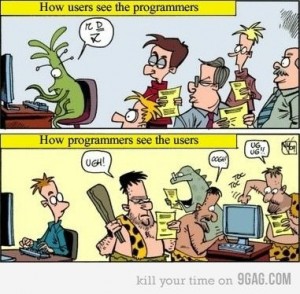Computer Scientists, the 'Computer Experts', and Those Who 'Know a Thing or Two' - Part 1: The Average Joe

How users see the programmers, how programmers see the users
Italian version available here
Written in 2006, while some tech details might be dated, this article's humorous take on IT 'experts' remains evergreen.
Have you ever received that frantic call from your next-door neighbor (or the latest friend in distress) with the ever-classic: "My Windows scanner isn't working anymore (or any other standard M$ issue)"? And how many times have you stumbled upon a practically Stone Age Windows, littered with tiny icons on the taskbar, three cascading antivirus programs (none of which are up to date), forty-two anti-spyware tools, and both the quick launch for MS Office and OpenOffice simultaneously? The outcome: twelve minutes and thirty-six seconds just to start the computer and instability comparable to a drunk trying to walk a tightrope 457 meters in the air. So, what do you do? You observe, perhaps raise an eyebrow if you're as expressive as I am, give the PC that "how do you even run?" look, and then pop the big question:
Who installed all this (useless) stuff here?
The proud, familiar response you get: "Oh, it was X. They're pretty tech-savvy!" Here, 'X' can be replaced with friend, neighbor, colleague, or the prodigious twelve-year-old computer genius.
Then, regretfully, you're in that awkward position to share the harsh truth: "This computer's a mess. The only solution is to reformat and keep only the essential software."
Stunned, they usually reply, "But X told me this computer is too old and needs replacing!" Upon investigation, you find a perfectly good processor, heaps of RAM, and an unnecessarily large hard drive. So, you wonder, "Why Windows 9Y?" The inevitable answer: "Because X said 9Y is the best Windows version!" Yet again, you're baffled, knowing well there's a different version of Windows that would be better (especially if you believe there's no such thing as the best Windows). Regardless, once the hardware reaches a certain threshold, that claim is NEVER accurate.
You've now planted a seed of doubt. Every time there was an issue, X magically had a software fix, but you're suggesting a complete restart? Doubt turns into suspicion: "Maybe you don’t know as much as X. After all, X installed so many antivirus programs, those software things I don't understand but seem important, all the Office suites, and now you want to delete everything?!" After some prodding, they reluctantly let you proceed, mainly because they can't bother X again.
You begin, under the watchful eyes of the computer's anxious owner... let's just fast-forward. They closely observe every move.
You install ONE antivirus, ONE anti-spyware tool, ONE office suite (usually OpenOffice depending on the user), and the necessary software. They ask, "Are you sure one antivirus is enough? Shouldn't we have two just to be safe?" You assure them it's enough, but doubt lingers.
The system runs smoothly. Boot-up is a swift 30 seconds, antivirus updates seamlessly, the computer is responsive, essential programs are intact, and half of the disk space is regained. Still, they're uneasy. How did their trusted friend X fail to fix it, but you did?
To resolve this, they arrange a meeting with both you and X. X grills you, questioning every move. You counter with a technical spiel, throwing in concepts from file systems to Turing machines, ending with a triumphant "Q.E.D." After a moment's silence, X questions if you installed some "magic" software that "defragments memory while consuming 98.2% of the CPU." Despite your explanations, their final judgment remains:
"I see, thank you. Everything's fine now. Good evening."
Later, you hear they criticized your expertise, commenting on the lack of additional themes, unchanged default background, and graphic settings. In their eyes, true "computer experts" immediately customize their graphics!
What's your takeaway? You either leave upset and undervalued if they didn't trust you or frustrated but satisfied if they did. Unfortunately, some still fall for the pseudo-experts who reinstall Windows twice a week, hoping to uncover some hidden powers.
The most absurd instance I've faced? While at university, a peer asked about my computer. When I mentioned owning an iBook (a Macintosh) running MacOS Panther, Debian Linux, and the then-new Ubuntu Linux, they asked about the hard drive's RPM. As I couldn’t recall the exact number, they snidely remarked, "Ah, so you're one of those who doesn’t really know."
Q.E.D.
Written and posted by: Stefano Marinelli